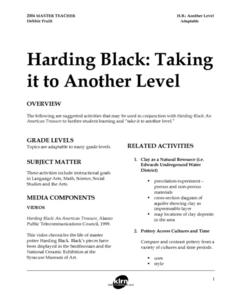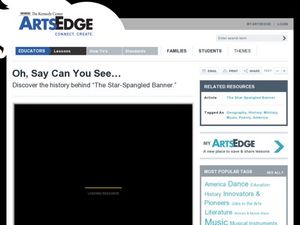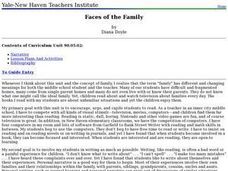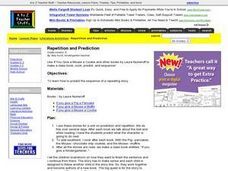Curated OER
Harding Black: Taking It To Another Level
Students complete a variety of activities related to the pottery of Harding Black and the uses of clay in San Antonio, Texas. They watch a video about the life of Harding Black, conduct a clay percolation experiment, compare and...
Curated OER
Science: Leaf Study
First graders go on a leaf-hunting expedition around the schoolyard. They determine from which trees they fell using identification cards. Students read several books about leaves and apply their artistic skills by using the collected...
Curated OER
Do Something Beautiful
Students recognize philanthropy in literature. For this philanthropy lesson, students read the book Something Beautiful by Sharon Wyeth and discuss how the character performed acts of philanthropy. Students write a reflection in a journal.
Curated OER
Oh Say Can You See?
Learners discover the meaning of patriotism through literature, songs, and poetry. They also identify patriotic symbols and activities such as the flag, the Pledge of Allegiance, the Star Spangled Banner, the bald eagle, and monuments.
Curated OER
Writing with Vivid Verbs
Learners find vivid verbs in literature and use them in their own writing. In this vivid verbs lesson plan, students use a 'Thinking Thesaurus' of major verbs to study common verbs. Learners then practice rewriting sentences using vivid...
Curated OER
Very Hungry Caterpillar - Tissue College
Students create tissue collages using paints, tissue paper, and glue in this cross-curricular art/literature lesson based upon the artwork of Eric Carle. Emphasis is placed upon the term collage and practicing collaging techniques.
Curated OER
Clifford Learns About the Four Seasons and So Do We!
Students explore the seasons and months of the year through literature, math, art and movement. They identify the month of their birthday and in which season it comes. Students name the four seasons and they memorize a poem to recite the...
Curated OER
Subtraction
First graders write and illustrate a story for a subtraction problem subtracting from the number ten. Students explore subtraction situations by using counters to represent a familiar number- based literature selection. Students role...
Curated OER
The Giving Tree
Young scholars investigate the virtue of kindness and giving by conducting a children's literature study of "The Giving Tree". They make a list of words to describe emotions in the story and write a journal daily while looking at the...
Curated OER
1,000 Cranes with a Pal
Students write a letter to a pen pal about the book they read 1,000 Cranes in Hiroshima. In this writing lesson plan, students write about the conflicts and events that occurred in the book.
Curated OER
Faces of the Family
Students and teachers share their individual concept of families to begin the lesson. As they read different pieces of literature, they keep a journal of the activities and problems each main character gets into. To end the lesson,...
Curated OER
Literal Meaning of Reading
Students practice basic reading skills. In this reading lesson plan, students review the letter M, read the story If You Give a Mouse a Muffin. Students will then write a book using their name, for example: If You Give a Taco to Tracy.
Curated OER
Sharing is Giving-The Drive
Students identify acts of philanthropy. In this philanthropy lesson plan, students define the term "hero" and read the book Stone Soup. Students discuss soup kitchens and complete a Venn diagram analyzing the differences between...
Curated OER
Easy to Read
Students compare reading passages in paragraph form to book form. They determine that the reading passages on the state assessments are no more difficult than the books they choose to read. They turn their favorite books into reading...
Curated OER
Our Global Community
First graders experience literature which shows how communities live around the world. In this global community activity, 1st graders read books such as Whoever You Are, by Mem Fox and create a work of art based on their feelings about...
Curated OER
"All Day Nightmare"
Students read an "All Day Nightmare" by R.L. Stine. They use the interactive book to choose the plot at the end of each chapter. They also complete an open-ended story.
Curated OER
Repetition and Prediction
Students discover how to predict the sequence of a story that repeats. They read different stories and predict what will happen to certain characters. They also finish sentences to create new lines in the book.
Curated OER
Character Mapping
Third graders choose one character from a book they have read recently. Using paper, they create a character map of the character along with a small drawing to show what they look like. To end the lesson, they share their character map...
Curated OER
Families and neighborhoods
Students create their house to add to a class "neighborhood". For this lesson on family and community, students read the book Family by Todd Parr and discuss how all families and houses are different. Then, students create their own...
Curated OER
If These Walls Could Talk: Seeing a Culture Through Human Features
Students read Talking Walls and discuss the walls presented and their importance to the culture. In this geography lesson, students locate and label each country/continent discussed in the book on a world map. Students take a walk and...
Curated OER
Mapping Roxaboxen
Fourth graders read Roxaboxen and draw a map of the Roxaboxen community. In this language arts and geography lesson, 4th graders use specifications given, adding features to the map as described in the book and creating a legend.
Curated OER
Me on the Map: Homes, Neighborhoods, and Communities
Students read a book about maps and identify the differences between a picture and a map. In this maps lesson plan, students also label maps of their home, neighborhood, and community.
Curated OER
Making the World a More Beautiful Place
Students discover how they can contribute in a positive manner in their community. In this service learning lesson, students experience literature through the lens of responsible citizenship.
Curated OER
Why are you special?
Students, after listening to book called People, by Peter Spier, discuss what are some things that make people different.























